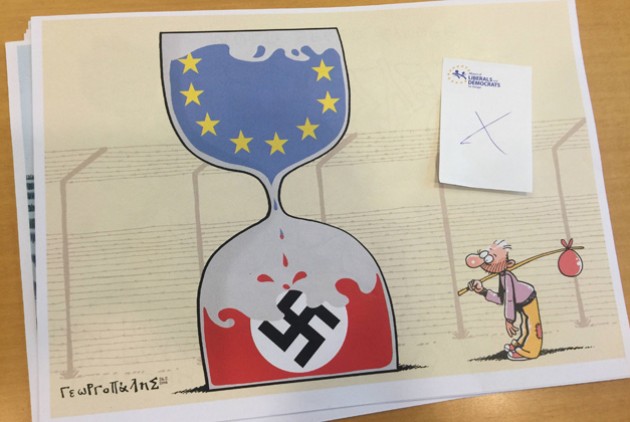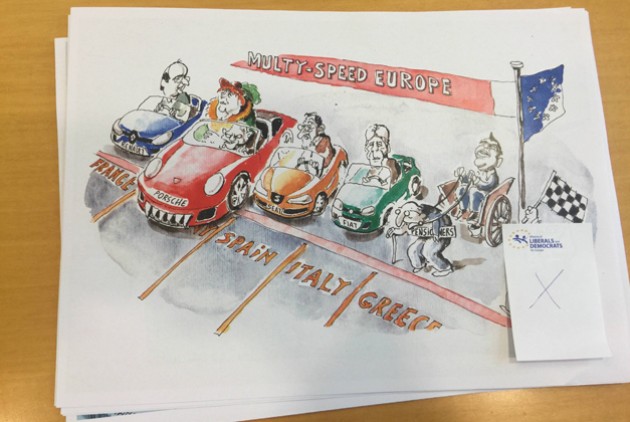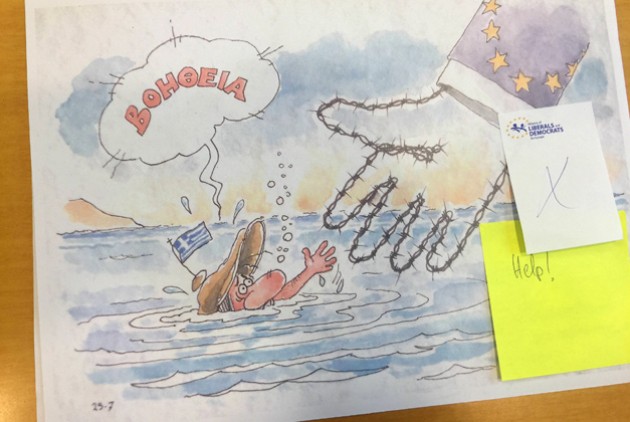Index relies entirely on the support of donors and readers to do its work.
Help us keep amplifying censored voices today.
[vc_row][vc_column][vc_column_text]Index on Censorship welcomes a European Parliament recommendation for the EU to ensure that Azerbaijan frees its political prisoners before the negotiations on a new deal between the EU and Azerbaijan are concluded. The recommendation mentions the jailed investigative journalist Afgan Mukhtarli as being among the “most emblematic cases”.
The talks on the new agreement that will govern relations between the EU and Azerbaijan were launched in 2017 and could be concluded in 2019. Azerbaijan has an extremely poor track record on human rights, as highlighted in a 2017 analysis by the European Parliament.
The European Parliament’s current recommendation calls on the EU to ensure that the deepening of relations with Azerbaijan is made conditional on upholding and respecting democracy, the rule of law, good governance, human rights and fundamental freedoms. It calls on the EU to underline the importance of a free and independent media and to ensure strengthened EU support, both political and financial, for a free and pluralistic press in Azerbaijan.
Joy Hyvarinen, head of advocacy at Index on Censorship, said: “We urge the EU to take a strong stand on media freedom and human rights in its talks on a new agreement with Azerbaijan. This is an opportunity for the EU to demonstrate global leadership and to promote fundamental European values. Freeing political prisoners such as investigative journalist Afgan Mukhtarli should be a priority.”[/vc_column_text][/vc_column][/vc_row][vc_row][vc_column][vc_basic_grid post_type=”post” max_items=”4″ element_width=”6″ grid_id=”vc_gid:1531833660337-cb577e58-d3f0-4″ taxonomies=”7145″][/vc_column][/vc_row]
Index on Censorship condemns the murder of investigative journalist Jan Kuciak in Slovakia — just months after the killing of Daphne Caruana Galizia in Malta. Kuciak was known for his investigations on tax fraud among businessmen connected to the country’s ruling party. He and his girlfriend were reported to have been shot dead at his home over the weekend, news website Dennik N reported on Monday, citing the Interior Ministry.
The murders raise troubling questions about the safety of media professionals in the European Union, says Index.
“A thorough and transparent investigation into the murder of Jan Kuciak is extremely important. Index calls on the European Union to ensure that an independent investigation takes place and that the legal process meets international standards” Index’s head of advocacy Joy Hyvarinen said. “Investigative journalism is vital to healthy democracies. In 2017, Index on Censorship’s Mapping Media Freedom platform documented 67 cases in which journalists were targeted with threats, violence and death for reporting on corruption.”
Corruption is becoming a major issue in the EU and neighbouring countries, undermining democracy and putting individuals at risk. Journalists play a key role in uncovering and fighting corruption through their investigations and, as a result, put themselves in danger.
On 16 October the Maltese journalist Daphne Caruana Galizia was murdered when the car she was driving exploded. Caruana Galizia published a number of articles on her blog investigating corruption.
“We need to stop behaving as if threats to journalists’ safety happen ‘somewhere else,’” said Index on Censorship CEO Jodie Ginsberg. “Prominent journalists in the United States get regular death threats – and are becoming used to it as part of their daily lives. Meanwhile, in the European Union two investigative journalists have been killed in less than six months. We need to wake up to this growing menace.”
On 16 August, Parim Olluri, editor-in-chief of investigative website Insajderi, was physically assaulted by unknown individuals outside his home in Kosovo’s capital Pristina. Olluri believes the attack was linked to his work. A few days before the assault, Olluri had published an editorial about corruption allegations against former Kosovo Liberation Army commanders, after which he received a torrent of abuse and threats on social media.
Failure to properly investigate cases and bring perpetrators to justice fosters an atmosphere encouraging further attacks.
[vc_row][vc_column][vc_single_image image=”96937″ img_size=”full” alignment=”center”][vc_column_text]PEN International, PEN Belgium/Flanders,the European Centre for Press and Media Freedom (ECPMF), Article 19,the Association of European Journalists (AEJ), the Committee to Protect Journalists (CPJ),the European Federation of Journalists (EFJ),the Global Editors Network (GEN), Index on Censorship, the International Press Institute (IPI), American PEN, Danish PEN, English PEN, Norwegian PEN, Wales PEN Cymru, Reporters without Borders (RSF),and the South East Europe Media Organization (SEEMO), welcome the opportunity to deliver this statement.
Working collectively, both jointly and separately, we have an established body of work on freedom of expression in Turkey, in part predating the attempted coup but intensifying since July 2016. Coming from the findings and concerns that have emerged through our work, on this occasion, we have developed four specific requests to the EU, its institutions including the European Parliament, and its Member States:
First, we call on the EU, its Institutions and its Member States to duly implement the EU Guidelines on Freedom of Expression and EU Guidelines on Human Rights Defenders and to live up the high expectations that were raised therein. Among other things, in the context of Turkey this will entail doing more to end the indiscriminate abuse of criminal legal proceedings against journalists and writers; calling more actively for an end to abusive state of emergency measures that impinge on human rights; and, advocating against restrictive legislation shrinking the space for civil society and human rights defenders. These concerns should be put from and centre not only in political dialogues and during high level visits, but also play a more prominent role when revisiting economic, trade and other agreements between the EU, its Member States and Turkey. Further, we believe the EU and its Member States should be more active when it comes to monitoring and condemning human rights violations.
Second, civil society is under attack in Turkey, and the space for civil society actors and human rights defenders is shrinking. Beyond the immediate impact on activists who are judicially or otherwise persecuted, the Turkish authorities’ actions are also having a chilling effect on actors who for now have remained outside its crosshairs. We call on the EU and its Member States to continue and expand its support to Turkish civil society, both politically and financially .[/vc_column_text][/vc_column][/vc_row][vc_row][vc_column width=”1/4″][vc_icon icon_fontawesome=”fa fa-times-circle” color=”black” background_style=”rounded” size=”xl” align=”right”][/vc_column][vc_column width=”3/4″][vc_column_text]
[/vc_column_text][/vc_column][/vc_row][vc_row][vc_column][vc_column_text]Third, it is our view that Turkey has been abusing INTERPOL’s Red Notice system to attempt to extend internationally its persecution of journalists, writers and others for having exercised peacefully their right to freedom of expression and opinion. The number of Red Notice requests emanating from Turkey has dramatically increased, and while under INTERPOL’s Constitution human rights must be respected in its operations and interventions of a political character are strictly prohibited, we believe that Turkey has been abusing the system in pursuit of nefarious political objectives.
Accordingly, we call on the EU and its Member States to:
Fourth, considering the many fair trial violations we have observed throughout our trial monitoring as well as the many other human rights violations committed by the Turkish authorities since the state of emergency was declared, the role of the European Court of Human Rights in ensuring justice for victims has become ever more important. Especially at a time when the Council of Europe’s human rights system is under pressure , emanating from actions or lack thereof by both EU and non-EU Member States. At the same time, even when duly taking into account the political and financial restraints placed onto the Council of Europe, it appears too deferential towards Turkey.
Accordingly, we call on the EU and its Member States to:
As international civil society actors, we are ready to contribute our expertise to constructive efforts by the EU and its Member States to support persecuted journalists and writers in Turkey and to improve the situation for freedom of expression in the country.[/vc_column_text][/vc_column][/vc_row][vc_row][vc_column][vc_basic_grid post_type=”post” max_items=”12″ style=”load-more” items_per_page=”4″ element_width=”6″ grid_id=”vc_gid:1513177371551-353126c9-b329-9″ taxonomies=”55″][/vc_column][/vc_row]
[vc_row][vc_column][vc_column_text]
The European Parliament is accused of censoring a series of political cartoons from Greece which were due to appear in an upcoming exhibition later this month.
The exhibition, organised by an MEP from Greece and an MEP from France, aimed to present political and humorous sketches created by cartoonists from the two countries and published in the press on the occasion of the 60th Anniversary of the Rome Treaty. However, Catherine Bearder, a British Liberal Democrat MEP from southeast England, who is responsible for the cultural and artistic events sponsored by other members, decided to remove 12 out of 28 cartoons, all created by Greek cartoonists, claiming that the artwork contained “controversial content”.
Index on Censorship approached Bearder for comment but at the time of writing she had not replied.
According to the regulation of the European Parliament, all cultural events and exhibitions have to be checked so that “under no circumstances be offensive or of an inflammatory nature or contradictory to the values” of the EU.
The Greek MEP, Stelios Kouloglou denounced the “unprecedented” form of censorship by the European Parliament. “The content of the censored cartoons did not insult the values of the European Union in any way,” Kouloglou said in a press conference in Strasbourg on Tuesday, 12 September.
The 12 cartoons are critical of the EU and focus mainly on the way the EU – and especially Germany – dealt with the Greek crisis. One of the censored cartoons features the starting line for a race, with Germany in a Porsche sports car, Italy, Spain and France in old cars and Greece in a chariot being pulled by a pensioner.
 Breader presented the upcoming German election as another reason to discard the 12 cartoons, although the exhibition is scheduled to take place after the election.
Breader presented the upcoming German election as another reason to discard the 12 cartoons, although the exhibition is scheduled to take place after the election.
“The right for artistic creation and freedom of expression are part of the European Union’s fundamental values. This arbitrary decision violates them” Kouloglou remarked in a letter of complaint addressed to the president of the European Parliament, Antonio Tajani.
The Journalists’ Union of the Athens Daily Newspapers also denounced the incident of censorship asking for the intervention of the European and International Federation of Journalists.

Credit: Stelios Kouloglou, MEP[/vc_column_text][/vc_column][/vc_row][vc_row][vc_column][vc_basic_grid post_type=”post” max_items=”4″ element_width=”6″ grid_id=”vc_gid:1505898132982-6897be5b-fada-1″ taxonomies=”5768, 1888″][/vc_column][/vc_row]